The information in this article is based on the personal experience of James Bernazzani, a special agent in the FBI for over 23 years. He now teaches at the masters level at The Tulane University School of Professional Advancement.
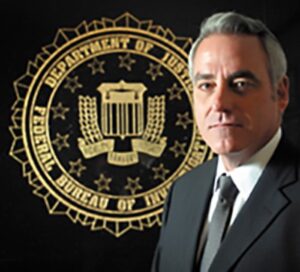
Basic Requirements
The FBI requirements are you have to be in shape, because the bad guys lift weights too. And you have to pass a medical exam to include hearing and visual, your eyes.
You’ve also got to be available. It’s called “the wants and needs of the Bureau.” You need to be able to move in a moment’s notice. I was married with kids and all of a sudden, I find myself in California or Argentina or the Golan Heights or the Congo going after terrorists who had killed Americans overseas. (See: How to become an FBI agent)
You have to carry a firearm and you have to be willing to use deadly force under two circumstances: One, your life’s in danger, or two, the lives of innocent third parties are in danger.
Life as an FBI Special Agent
James was finishing up his Master’s Degree at Harvard when the bombing of the barracks in Beirut happened and his friend was the last body to be pulled out. He had no prior interest in a career in law enforcement, but that day was a pivotal moment and he spent the rest of his career fighting terrorism. Here’s his personal account of life as a special agent in the FBI.
The Calling
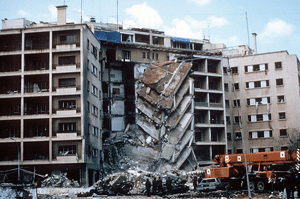
I played a high level of university ice hockey and became close friends with Mike Haskell, who was on the team. He was a Marine Sergeant in Vietnam and went to Harvard because he needed a degree in order to become an Officer. Mike went back into the Corps in 1983, became a Captain, and ended up being the last body pulled out of Beirut Marine Corps barracks bombing on October 23, 1983. I called a friend who had become an FBI agent and decided to get into the Bureau himself to fight the guys who killed my friend.
We thought the FBI was domestic, within the United States. No, we have an overseas presence. We have extra territorial jurisdiction and as long as three factors are met: One, American citizens are killed. Two, significant U.S. property, like an embassy building or an airliner, is destroyed. And three, the host government has to invite us in to help. We’re not covert. We’re overt. Once those three factors are met, that’s when I used to go overseas and hookup with them and go after the bad guys.
Life in Quantico
Everybody thinks the FBI is a law enforcement organization. We’re not. We carry two hats. The fundamental mission of the FBI is not to make arrests or incarcerate people. It’s to uphold the Constitution of the United States. That’s it. And we were very good at it. It’s a question of balance and we were very, very good at it.
There’s some tremendous talent from all walks of life in the FBI. Everybody thinks that Quantico is full of ex-cops, but it’s not. When I was at Quantico, I was a school teacher and a hockey player. Next to me was a fighter pilot. And on the other side of him was a dance choreographer from Broadway. But then, we all excelled in a particular discipline and basically Quantico made us FBI agents, taught us the FBI way.
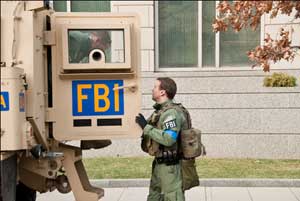
When I went to Quantico, I had never, never shot a gun in my life, but I was a pretty good athlete and they taught me the Bureau way to shoot. When I came out, I was an excellent shot and I went on the SWAT team for seven years. (See: FBI SWAT)
Counter Terrorism Abroad
On June 18, 1984, I started at the FBI Academy at Quantico. After Quantico, I was assigned to New Orleans division. In October 1984, I was assigned to New Orleans Squad Seven for international terrorism, where I served for 7 years.
In 1991, I transferred to Washington D.C. and became part of the CT1 squad for counter terrorism. Eventually, I made it to the CT2 squad, which is international counter-terrorism, and went to North Africa. I did a lot of work in the Congo, a lot of work in a place called Benin, working in Gemena, Central African Republic, which butts up to the Southern border of Libya at that time.
By far and away, the Central African Republic, C-A-R, they call it, there’s a city there that’s called Dang Gee, which was the Wild West for our country in the 1860’s. I mean, it was challenging. It was an urban center surrounded by the deepest, darkest jungles that I’ve ever been in. They have wildlife there, you know. It’s just not the bad guys. It’s the lions, for God’s sake. And a lot of chimpanzees who are very strong, by the way.
Believe it or not, the French Foreign Legion had fortress there, a huge stone fortress. I sought refuge there. Went into the jungles in the middle of nowhere. I can speak Spanish and the conscripts are all local soldiers, but the leadership are all French military officers. I ran up to the front doors, sort of like in the Wizard of Oz when they go into Emerald City and there were those huge round doors that open up – This thing was built way up and I stayed there for I would say probably about a week, something like that, until I could figure out how the heck I was going to get out. I wasn’t running away from them. I was just living for tomorrow with a fight again. And they were very, very accommodating, very accommodating. The French.
After that, I got promoted to headquarters, on the Hezbollah unit, and I was a GS-14. I was flying a desk basically. Then I started going overseas again.
Then, I ran a joint terrorism task force in Houston, Texas. Multi-agency. And then I got yanked back to headquarters and I was made the chief of Hezbollah operations. Then, they sent me down to Houston again to be the ASAC for the drug program, and then 9/11 hit. I get my luck yanked back.
9/11 Experience
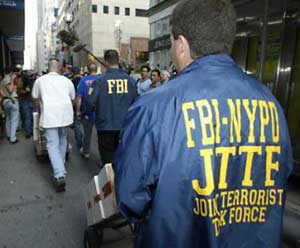
I lost two very, very good FBI buddies in that. John O’Neill, who was the head of security. Very good friend of mine. He was in the building when it collapsed. And there was an agent assigned to the New Orleans Division when I was at first office agent, but he was assigned to New York. But I didn’t know this. As an agent, he was also a volunteer firefighter and he responded as a volunteer firefighter to the building. And he was inside when that one collapsed. Killed him too.
And so, I went up there. The one thing I remember about the whole thing… Obviously the devastation, mother of God, and I was in the pit and I say, “Well what do you think I smelled? And it says, “Oh human flesh,” you know, whatever. I said, “No, it was overpowering fuel oil.”
And it got into my clothes. I washed them something like three times, but I couldn’t get rid of it. I had to throw them out. Fuel oil was just omni present in that thing because you know the hijackers picked those planes out of Boston because they were transcontinental. So, either Vegas or Southern California, and they had full tanks of gas.
Post-9/11
After visiting the site of the attack, I said, “What am I doing? What am I going to do?” They say, “We don’t know, you just get up there.” I says, “All righty.” So, I walked by FBI headquarters. I walk in, I think Director Mueller had only like seven days on the job when 9/11 hit. He says, “We’re signing you over to a CIA.” I go, “What?”
He says, “Yeah, there’s a group over there called the CTC, Counter Terrorism Center. We want you to head up the FBI.” We had some FBI agents over there, probably about maybe 10, and I was promoted to the Deputy Director for Law Enforcement at the CIS Counter Terrorism Center. George Tenant was the director at that time.
Robert Mueller was the director of the FBI. Then-president Bush, 43, the son, post 9/11, established an integration center for federal intelligence and local and state intelligence relative to the counter terrorism threat. It was called the Terrorist Threat Integration Center. Director Tenant appointed John Brennan to head it up.
I didn’t know John, but I got a phone call from the number-two guy in the FBI at that time, John Crystal. He served in the Boston Division. He said, “Jimmy, congratulations on your new promotion.” But I hadn’t put in for these jobs. I was just receiving phone calls. I said, “Yes, sir.” Wants and needs of the Bureau. Be available. So, I was principal, Deputy Director of the Terrorist Threat Integration Center, TTIC, which was a success story post 9/11. It eventually set the foundation for the new National Counterterrorism Center, which is in the news all the time.
The following April, I got promoted to Special Agent in Charge of the New Orleans Division. And then, I’m thinking like, you know, I’m finally out of the terrorism wars, sort of like a relax a little bit, maybe deal with a serial killer or something like that. But then, Katrina hits, and I did it for three years. Then I retired, went to Tulane to teach, and I’m still doing that right now.
Double-Life
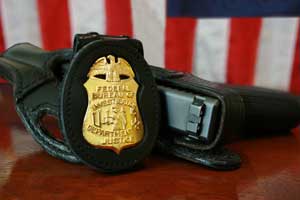
“How was your day?”
I’d say, “Good.”
“What did you do?”
“Did my job.”
That was about the extent of the conversation because I couldn’t divulge. FBI agents all have to qualify for a top-secret clearance, and part of that top-secret clearance is that you cannot talk to your spouse about what you’re doing. So, you really got to dance around it.
The whole idea of being an effective FBI agent is understanding discipline and have the ability to conceptualize and move forward in an accordingly safe manner.
These were all temporary assignments. I was never permanently stationed overseas. But I’m telling you, one time, I went into a bad-guy area, and my wife goes, “How long do you think you’re going to be gone?” I said, “About two weeks probably.” I was gone seven weeks and I couldn’t communicate with her.
And so, you know, when I come back home, she thinks I’m dead, and I just basically showed back up seven weeks later and she put up with it. She understood. And that whole family network for FBI agents is very, very important. You have two families when you’re an FBI agent: You have your personal family and you have the FBI family and it’s a balancing act.
Is he going to take care of both of them? We do it very, very well. It was always overt. My true name, the fact that I was an FBI agent, the bad guys knew it. And it wasn’t like I became a target as much as they were trying to figure me out. And I was trying to figure them out, and it worked out pretty well.
No, I was not covert at all. The government knew I was in town because of the factors, the extraterritorial facts, that I was talking about. They invited us in. There was an expectation with clarity and transparency that you would work with the host government services that have their own national security concerns.
And I worked with some great, great guys over there, men and women. We were people of kindred spirit because even though we spoke a different language and had a different upbringing, we both understood one thing: terrorism is abhorrent. It kills the innocent, and these people were like-minded, so together we would go after them.
Identifying Operations
When you look at an organization, it’s basically five characteristics: Leadership, membership, finances, communication and assets. Assets being, what do they have to use? That it’s going to be a truck bomb or it’s going to be a rifle and everything in-between.
Once you identify one of those characteristics, you get inside of that organization and you identify the other four. Then you understand the breadth and scope of the threat picture that you’re dealing with. And like I say, the FBI does that very, very well.
For example, Hezbollah was big into cocaine. Bank fraud and embezzlement, illegal arms movement. A lot of white-collar crime. Non-violent crime to support filling that financial piece of the five characteristics mobilization.
Terrorist operations cost money. But you know the assets, and I teach this at Tulane, on 9/11, the most horrific terrorist attack in this country, their only asset was the plane tickets they bought. Then, they hijacked the aircrafts and just drove them right into the buildings.
How to Apply to be an Agent
For how to become an FBI Agent, if you go online, fbi.gov is the application process. Fill out the application and do not lie and do not boast. Brass tacks tell the truth because you will go through a rigorous background investigation, which I agree with because our adversaries have tried to put their people into the FBI Academy.
Once you apply, you go through a very rigorous police background check, background investigation, and you get polygraph test questions. For FBI Special Agent training, you go through a 19-week session at Quantico and then you’re assigned to your first office and I think you’re on 18-month probation to see how you perform.
Was it Worth It?
My father was a heavy machine gun in World War 2. He was in the Sunburst Division in the Pacific, and I’m in the driveway getting ready to pull out the drive down to Quantico and he’s mowing the lawn, front lawn. And he walks up to me. He says, “Hey.” I said, “Yeah, Dad?”
He goes, “Do you know what FBI means?” I said, “Yeah.” Smart ass. “Federal Bureau of Investigation.”
He goes, “Yeah, that’s true for the general public. But I mean, for an FBI agent, do you know what FBI means?” It’s the first time I hear this, I says, “What, Dad?”
He goes, “Fidelity, bravery, integrity.” He goes, “Do you know what fidelity is? I said, “Yeah, Dad.”
“You know what integrity is?” I said, “Yeah, Dad.” He goes, “You know what bravery is?” I said, “Yeah, courage.”
He says, “Well,” he says, “Bravery is nothing more than understanding your fear and overcoming it.” And I took that to the bank. So that was one of my linchpins, so to speak, in whatever I was doing.
It was the best job in God’s creation. It was fulfilling, it was meaningful, it produced positive results for the general public and it supported the United States Constitution.
James Bernazzani was a recent guest on the Go Law Enforcement Podcast. Click here to listen to episode featuring Mr. Bernazzani.
Related Articles:
• Police Hostage Negotiator
• Homicide Detective
• Police Officer Jobs
• Jobs in Law Enforcement

 Joseph Libowsky,
Joseph Libowsky,